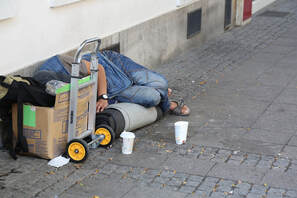“Homeless” versus “unhoused” Sometimes on our walks, my dogs and I pass a row of tents. It’s not unusual for the dogs to try to nose their way in. “No,” I tell them, pulling gently back on the leash, “that’s someone’s home.” A sidewalk tent may not seem like much of a home to some, and it is almost certainly illegally placed, but it is nonetheless someone’s home. That’s one reason I like referring to its occupants as “unhoused” rather than “homeless.” Another is that I find “unhoused ” more humanizing. Er, “sweeping”? I don’t pretend to have a solution for helping the unhoused. But it’s not hard to recognize non-solutions. Take the city of Portland, Oregon, my home as of two years ago. Last week, The Oregonian reported, “In mid-October, the city of Portland removed more homeless encampments than at any point since the start of the pandemic, sweeping 87 in a single week.” Er, “sweeping?” The unhoused are not debris. They are people. A few lines later was this gem: “It’s unclear where the people who lived in those camps have gone.” Thus the city’s “solution” becomes clear. The objective is not to help the unhoused. It is not to address causative, systemic factors. It is to move the unhoused out of one neighborhood’s sight and into another’s, and, when the second whines, to move them again. Move the man who fell among thieves out of view, and the Good Samaritan need not haunt us. The laziness myth I bristle at the likes of “they’re lazy” and “they just don’t want to work.” I’d be curious to know how the glib condemners eliminate other possibilities, such as catastrophic health events, job losses and other economic factors, accidents, provider deaths, legal machinations, mental illnesses, or convergences of miscellaneous bad luck, to name a few. They’re lazy? Really? Being unhoused doesn’t resemble a lazy person’s paradise from where I’m standing. Imagine: living in a tent, under a viaduct, or in a park; digging through trash for food and clothing; suffering through constant exposure to weather extremes; getting along without indoor plumbing, therefore no toilet, washbasin or shower; living without heating or cooling; putting up with public scorn; having no access to health care; having no car; having no electricity; having no online devices or access; and more. I don’t know anyone who would choose that lifestyle at all, much less out of laziness. I, for one, am too lazy to attempt it. Some unhoused are employed. In this country, employers are not required to pay a living wage. Holding a full-time job is no assurance of being able to rent, much less buy, a home. Think about that if you scorn the unhoused and oppose raising the minimum wage. Imagine you’re an employer. Now stroll through an encampment or past unhoused persons roaming the street. Which ones would you hire? To do what? What’s that, you say? No one there you’d hire? Then maybe it’s not as simple as “They don’t want to work.” The they’re lazy / they don’t want to work rhetoric serves only one purpose. It makes being unhoused a choice, a morally defective choice at that. Thus to help is to enable. What they need is tough love! That is how you turn “helping” into “not helping” and “not helping” into “helping.” It is how people feel righteous about reacting to the unhoused with scorn instead of empathy. Victim-blaming, which this is, is nothing new. “They’re lazy” and “they don’t want to work” are victim-blaming dressed up in well-worn, hand-me-down clothes. ***
0 Comments
Your comment will be posted after it is approved.
Leave a Reply. |
Welcome to Cunoblog... where I share thoughts about writing. I don’t consider myself a writing authority, but that doesn’t keep me from presuming to blog like one. Oh, and I reserve the right to digress when I feel like it. Archives
July 2024
|

 RSS Feed
RSS Feed